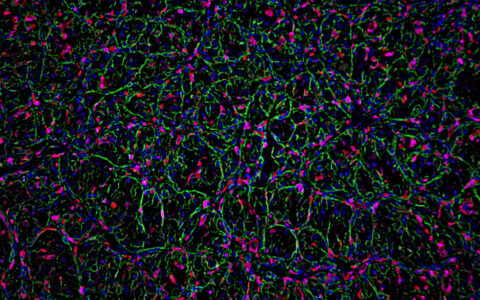Oncologists have an expanded arsenal of targeted and immunotherapies for metastatic melanoma, a disease that previously came with a bleak prognosis. Douglas Johnson, M.D., clinical director of the Melanoma Research Program at Vanderbilt-Ingram Cancer Center, is among the first physicians to prescribe these treatments and an expert on how patients respond. His research has been published in The New England Journal of Medicine and The Lancet.
“There’s been a remarkable amount of progress over the last five to seven years in the treatment of metastatic melanoma,” Johnson said. “We have moved from essentially no treatments that improve patient survival to now having over 10 different treatments.”
At ASCO 2019, Johnson led a discussion on long-term outcomes for the targeted therapies encorafenib (Braftovi) and binimetinib (Mektovi), and the immunotherapies pembrolizumab (Keytruda), nivolumab (Opdivo) and ipilimumab (Yervoy).
New Research Questions
“Not every patient responds to these new treatments, but half of patients respond very well. What are the long-term outcomes for those patients?”
“We used to have a very short survival with metastatic melanoma. Now, we’re getting into a new set of questions,” Johnson said. “Not every patient responds to these new treatments, but half of patients respond very well. What are the long-term outcomes for those patients? Are they really having long-term survival or are the tumors coming back at some point?”
Vanderbilt researchers are investigating why some patients respond to immunotherapies while others don’t. Lines of inquiry include assessing the number of type of mutations in a tumor, how MHC-II may predict response and what role body composition might play.
Role of Body Composition
Recent studies have shown that obese patients, especially men, respond better to immunotherapy than slim men, but those studies were largely based on body mass index (BMI), Johnson said. Arissa Young, M.D., a resident at Vanderbilt University Medical Center, and Johnson have conducted a more in-depth investigation, using CT scans to better assess body composition at the level of the L3 vertebra.
“What we found in our study was that patients who have high muscle and high fat content do the best, whereas the outcomes from other groups are not as good,” Johnson said. “So the relationship between high BMI and response seems to be driven by this high fat/high muscle group. However, patients from all body composition types can still respond to treatment.”
Next Steps
Research from Vanderbilt-Ingram Cancer Center identified MHC-II as a possible predictor of response to immunotherapy, and a clinical trial is underway to screen metastatic melanoma patients for it. Johnson is working with Justin Balko, Ph.D., on the initiative.
“If patients are positive for MCH-II, they will get a new immunotherapy combination, nivolumab plus relatlimab,” Johnson said. “Relatlimab is an experimental immunotherapy that has shown some promise in early trials. If patients are negative, they will receive the most aggressive currently-available regimen, nivolumab plus ipilimumab.”





